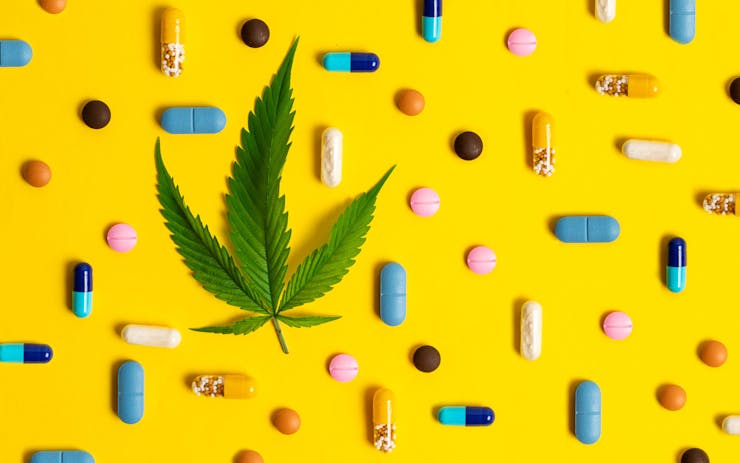Do you avoid grapefruit juice for medical reasons? You might want to stay away from CBD, too.
Many common prescription medications come with a surprising warning to avoid grapefruit juice while taking them. How could something as innocuous as grapefruit juice affect a prescription medication?
But it can, and another seemingly harmless—and arguably more ubiquitous—substance can also affect the absorption of certain prescription medications. It’s cannabidiol, or CBD, which can now be found in everything from dried cannabis flower to sparkling water.
More than 100 different cannabinoids—naturally-occurring chemical compounds unique to cannabis—have been identified, according to the University of California Los Angeles.
One of those compounds is CBD, which is not only found in the cannabis plant (and oils and tinctures made from it), but is also an additive in an increasing number of food and wellness products. Research is ongoing, but CBD has been shown to be reduce the frequency of epileptic seizures, and is used by some people to treat anxiety, insomnia, and chronic pain.
Unfortunately, consuming CBD may create problems for people who take certain other medications. The issue isn’t the compounds found in cannabis on their own, explains Dr. Robert Flannery. It’s the way those compounds—CBD in particular—interact with other medications.
CBD and CYPs
“CBD is a competitive inhibitor to a group of enzymes called cytochromes P450 (CYPs),” says Flannery, who founded Dr. Robb Farms and has a PhD in plant biology with a focus on cannabis production. “This group of enzymes work in the liver to oxidize and break down many of the other medicines that we consume.”
CYPs are the major enzymes involved in drug metabolization, and important to consider when working to prevent drug interactions or contraindications. In addition to CBD, there are other non-prescribed substances and compounds that affect CYPs, including St. John’s Wort, watercress, and goldenseal.
CBD doesn’t appear to directly affect the absorption rate of medicines metabolized by CYPs, says Flannery. However, when CBD binds to CYPs, that prevents other medications from binding to CYPs—which slows down the rate CYPs metabolize those medications. This matters because dosing for prescribed medications is calculated based on the average metabolic breakdown rates for those medications.
“If we slow that process down, we will be changing what that dosage needs to be,” says Flannery.
“Taking an oral dose of CBD…can block the CYPs from metabolizing certain medications completely,” Flannery says. “The medicine will now remain in the body in an active form for a longer period of time than they were intended to be.”
More research needed
The research on this goes back some time. At the University of California San Francisco, Dr. Lester Bornheim began studying the effects of CBD on CYPs in the 1980s. Other papers have looked at how tetrahydrocannabinol (THC) and cannabinol (CBN) affect CYPs, though Flannery says those effects are not as significant as CBD’s.
There are other examples of an otherwise innocuous compound or substance affecting medicine absorption. Remember that grapefruit juice?
“If you’ve ever been prescribed a medication, picked it up at the pharmacy, and the pharmacist insists you avoid consuming the prescribed medication in conjunction with grapefruit or grapefruit juice, then you have experienced a similar situation,” says Flannery. That’s because grapefruits also have compounds—bergamottin and 6′,7′-dihydroxybergamottin—that affect the metabolic rates of CYPs.
However, if you are consuming cannabis, check any medications you are currently taking or are prescribed in the future. If those medications are known to have drug interactions with grapefruit juice, you should inform your doctor and/or pharmacist about your cannabis consumption, Flannery says. This is true whether you are using cannabis for medicinal or recreational reasons.
Drugs affected by grapefruit juice include blood thinners, cholesterol medications, blood pressure medications, and some mood medications. And according to the Indiana University Department of Medicine, medications known to pass the CYP450 pathway include antidepressants, antipsychotics, beta-blockers, HIV antivirals, and steroids.
Not all of these drugs would necessarily be a problem, and others may be affected, which is why it’s important to speak with a medical professional about your particular situation.
“Unfortunately, there is more research that is necessary to better understand what cannabis doses can inhibit CYPs and how much CBD—along with how it is consumed, smoked/vaped, or eaten—will affect the metabolic breakdown of drugs,” Flannery says.





